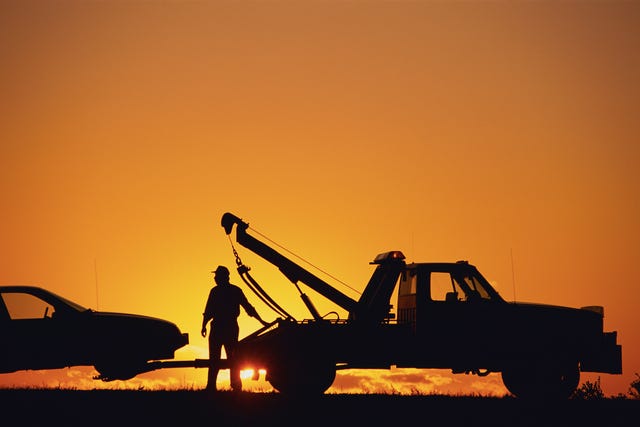Tow Your Rights: When Your Car Is Taken, Rules Vary Wildly between States

Richard Hamilton SmithGetty Images
- Sure, if your car is parked illegally, local law enforcement can have it towed. But after that, your life might be easier or much more difficult depending on which state you live in, says consumer watchdog U.S. PIRG.
- Rules about when you can get your car back, whether you can access personal items inside the vehicle, or what happens if the tow truck driver damages your car, all change from state to state.
- If you do get towed, Illinois, Maryland, Missouri, and New Mexico have some of the strongest protections for drivers. Indiana, Iowa, Mississippi, New Hampshire, South Dakota, and Vermont have some of the worst.
Towing an illegally parked automobile is, almost by definition, a local issue. But if you’re not the type of person who gets towed in multiple cities each year, you might not know just how different your rights are depending on which locality your car was in when it was towed. To learn about the rights in your state, consumer watchdog group U.S. PIRG has created a state-by-state search tool with localized information that launches today.
The towing industry (including consensual tows, like when your car breaks down) is a market worth over $8 billion a year in the United States, according to market researcher IBISWorld, and that number is expected to grow by 11 percent in 2021. With that many tows happening, the involuntary ones can present a number of different problems for drivers. A new report from the U.S. PIRG Education Fund, a nonprofit public interest group, details just how varied the rules can be throughout the U.S.
Federal law allows state or local authorities to regulate the price of nonconsensual towing, but most other aspects of towing—like which hours a place has to be open where you can get your car back, or what kinds of payment a towing company has to accept—are excluded from federal preemption, U.S. PIRG’s consumer watchdog associate, Grace Brombach, told Car and Driver. She said the states with the strongest protections for people who’ve had their cars towed are Illinois, Maryland, Missouri, and New Mexico. The states with the fewest laws are Indiana, Iowa, Mississippi, New Hampshire, South Dakota, and Vermont.
“Unfortunately, some state laws date back to the 1970s and too many state governments haven’t prioritized updating their protections,” she said. “Many cities have tried to bridge the gap by strengthening driver protections, but without state law to back them up, it’s often hard to enforce.”
Few people think about their car getting towed until it happens, she said, and when it does, understanding the law isn’t usually at the top of a person’s list. “Consumers likely aren’t aware of their rights,” she said. “If someone looks you in the eye and says that they don’t have to detach your car from a tow truck, and you have no evidence to the contrary, you’re less likely to argue or file a complaint.” But you can argue the law if you know the law. For example, if you’re in one of the 18 states where there are rules regarding “incomplete tows”—when you show up at your vehicle before it has left the property where it shouldn’t have been parked in the first place—the tow truck driver has to release your car back to you, for free or perhaps at a smaller “drop fee,” U.S. PIRG found. In the other 32 states, you can’t.
Here are some other quirky details about towing laws in the U.S. in U.S. PIRG’s report:
- The towing company has to notify the car’s owner that it has been towed and where it’s being stored in just 37 states.
- If the towing company damages your vehicle while it is towing or storing the vehicle, they have to reimburse you in just 23 states.
- There are only 20 states where a towing storage facility has to give you access to all of the personal items in your towed vehicle. Another nine states will let you retrieve emergency items, like keys, money, or medication.
- The tow company has to display its tow rates, either on “tow away” signs or at their storage facility, in just 14 states.
- The tow truck driver has to take a picture of the car before moving it in just four states.
These unequal rules mean there is plenty of consumer anger about getting your car towed, Brombach said, “but because of the patchwork of laws, and the inconsistency of which agencies regulate towing in each jurisdiction, people have no idea what to do about it.”
U.S. PIRG has some proposals, including a list of 14 “common sense towing protections” that it said should be law in every state. These include clearly defining who is responsible for damages that happen while towing the car and setting maximum fees for nonconsensual tows. To learn about the rights in your state, U.S. PIRG has created a state-by-state search tool with localized information that launches today.
This content is imported from {embed-name}. You may be able to find the same content in another format, or you may be able to find more information, at their web site.
This content is created and maintained by a third party, and imported onto this page to help users provide their email addresses. You may be able to find more information about this and similar content at piano.io

